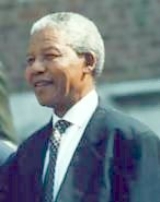
from 1994 to 1999, and was the first South African president to be elected in a fully representative
democratic election. Before his presidency, Mandela was an anti-apartheid activist, and the leader of Umkhonto we Sizwe
, the armed wing of the African National Congress
(ANC). In 1962 he was arrested and convicted of sabotage
and other charges, and sentenced to life in prison.
Only free men can negotiate; prisoners cannot enter into contracts. Your freedom and mine cannot be separated.![]()
I stand here before you not as a prophet but as a humble servant of you, the people. Your tireless and heroic sacrifices have made it possible for me to be here today. I therefore place the remaining years of my life in your hands.![]()
Let's hope that Ken Osterbroek will be the last person to die.![]()
I must deal immediately and at some length with the question of violence. Some of the things so far told to the Court are true and some are untrue. I do not, however, deny that I planned sabotage. I did not plan it in a spirit of recklessness, nor because I have any love of violence. I planned it as a result of a calm and sober assessment of the political situation that had arisen after many years of tyranny, exploitation, and oppression of my people by the Whites.
![]()

